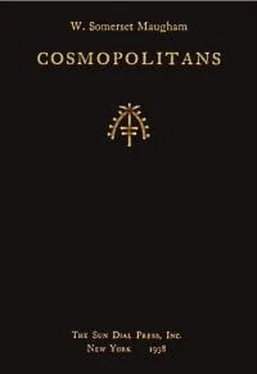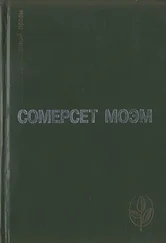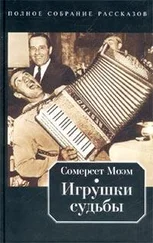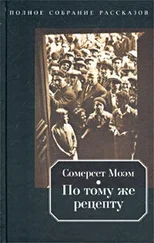Уильям Моэм - Cosmopolitans
Здесь есть возможность читать онлайн «Уильям Моэм - Cosmopolitans» весь текст электронной книги совершенно бесплатно (целиком полную версию без сокращений). В некоторых случаях можно слушать аудио, скачать через торрент в формате fb2 и присутствует краткое содержание. Город: New York, Год выпуска: 1938, Издательство: The Sun Dial Press, INC., Жанр: Классическая проза, short_story, на английском языке. Описание произведения, (предисловие) а так же отзывы посетителей доступны на портале библиотеки ЛибКат.
- Название:Cosmopolitans
- Автор:
- Издательство:The Sun Dial Press, INC.
- Жанр:
- Год:1938
- Город:New York
- ISBN:нет данных
- Рейтинг книги:5 / 5. Голосов: 1
-
Избранное:Добавить в избранное
- Отзывы:
-
Ваша оценка:
- 100
- 1
- 2
- 3
- 4
- 5
Cosmopolitans: краткое содержание, описание и аннотация
Предлагаем к чтению аннотацию, описание, краткое содержание или предисловие (зависит от того, что написал сам автор книги «Cosmopolitans»). Если вы не нашли необходимую информацию о книге — напишите в комментариях, мы постараемся отыскать её.
Cosmopolitans — читать онлайн бесплатно полную книгу (весь текст) целиком
Ниже представлен текст книги, разбитый по страницам. Система сохранения места последней прочитанной страницы, позволяет с удобством читать онлайн бесплатно книгу «Cosmopolitans», без необходимости каждый раз заново искать на чём Вы остановились. Поставьте закладку, и сможете в любой момент перейти на страницу, на которой закончили чтение.
Интервал:
Закладка:
At last their angels took them by the hand and led them to the Presence. For a little while the Eternal took not the slightest notice of them. If the truth must be told he was in a bad humour. A moment before there had come up for judgement a philosopher, deceased full of years and honours, who had told the Eternal to his face that he did not believe in him. It was not this that would have disturbed the serenity of the King of Kings, this could only have made him smile; but the philosopher, taking perhaps an unfair advantage of the regrettable happenings just then upon Earth, had asked him how, considering them dispassionately, it was possible to reconcile his All-Power with his All-Goodness.
“No one can deny the fact of Evil,” said the philosopher, sententiously. “Now, if God cannot prevent Evil he is not all-powerful, and if he can prevent it and will not, he is not all-good.”
This argument was of course not new to the Omniscient, but he had always refused to consider the matter; for the fact is, though he knew everything, he did not know the answer to this. Even God cannot make two and two five. But the philosopher, pressing his advantage, and, as philosophers often will, drawing from a reasonable premise an unjustifiable inference, the philosopher had finished with a statement that in the circumstances was surely preposterous.
“I will not believe,” he said, “in a God who is not All-Powerful and All-Good.”
It was not then perhaps without relief that the Eternal turned his attention to the three shades who stood humbly and yet hopefully before him. The quick, with so short a time to live, when they talk of themselves, talk too much; but the dead, with eternity before them, are so verbose that only angels could listen to them with civility. But this in brief is the story that these three recounted. John and Mary had been happily married for five years and till John met Ruth they loved each other, as married couples for the most part do, with sincere affection and mutual respect. Ruth was eighteen, ten years younger than he was, a charming, graceful animal, with a sudden and all-conquering loveliness; she was as healthy in mind as she was in body, and, eager for the natural happiness of life, was capable of achieving that greatness which is beauty of soul. John fell in love with her and she with him. But it was no ordinary passion that seized them; it was something so overwhelming that they felt as if the whole long history of the world signified only because it had led to the time and place that had brought them together. They loved as Daphnis and Chloe or as Paolo and Francesca. But after that first moment of ecstasy when each discovered the other’s love they were seized with dismay. They were decent people and they respected themselves, the beliefs in which they had been bred, and the society in which they lived. How could he betray an innocent girl and what had she to do with a married man? Then they grew conscious that Mary was aware of their love. The confident affection with which she had regarded her husband was shaken; and there arose in her feelings of which she would never have thought herself capable, jealousy and the fear that he would desert her, anger because her possession of his heart was threatened and a strange hunger of the soul which was more painful than love. She felt that she would die if he left her; and yet she knew that if he loved it was because love had come to him, not because he had sought it. She did not blame him. She prayed for strength; she wept silent, bitter tears. John and Ruth saw her pine away before their eyes. The struggle was long and bitter. Sometimes their hearts failed them and they felt that they could not resist the passion that burned the marrow of their bones. They resisted. They wrestled with evil as Jacob wrestled with the angel of God and at last they conquered. With breaking hearts, but proud in their innocence, they parted. They offered up to God, as it were a sacrifice, their hopes of happiness, the joy of life and the beauty of the world.
Ruth had loved too passionately ever to love again and with a stony heart she turned to God and to good works. She was indefatigable. She tended the sick and assisted the poor. She founded orphanages and managed charitable institutions. And little by little her beauty which she cared for no longer left her and her face grew as hard as her heart. Her religion was fierce and narrow; her very kindness was cruel because it was founded not on love but on reason; she became domineering, intolerant and vindictive. And John resigned, but sullen and angry, dragged himself along the weary years waiting for the release of death. Life lost its meaning to him; he had made his effort and in conquering was conquered; the only emotion that remained with him was the unceasing, secret hatred with which he looked upon his wife. He used her with kindness and consideration; he did everything that could be expected of a man who was a Christian and a gentleman. He did his duty. Mary, a good, faithful and (it must be confessed) exceptional wife, never thought to reproach her husband for the madness that had seized him; but ail the same she could not forgive him for the sacrifice he had made for her sake. She grew acid and querulous. Though she hated herself for it, she could not refrain from saying the things that she knew would wound him. She would willingly have sacrificed her life for him, but she could not bear that he should enjoy a moment’s happiness when she was so wretched that a hundred times she had wished she was dead. Well, now she was and so were they; grey and drab had life been, but that was past; they had not sinned and now their reward was at hand.
They finished and there was silence. There was silence in all the courts of heaven. Go to hell were the words that came to the Eternal’s lips, but he did not utter them, for they had a colloquial association that he rightly thought unfitting to the solemnity of the occasion. Nor indeed would such a decree have met the merits of the case. But his brow darkened. He asked himself if it was for this that he had made the rising sun shine on the boundless sea and the snow glitter on the mountain tops; was it for this that the brooks sang blithely as they hastened down the hillsides and the golden corn waved in the evening breeze?
“I sometimes think,” said the Eternal, “that the stars never shine more brightly than when reflected in the muddy waters of a wayside ditch.”
But the three shades stood before him and now that they had unfolded their unhappy story they could not but feel a certain satisfaction. It had been a bitter struggle, but they had done their duty. The Eternal blew lightly, he blew as a man might blow out a lighted match, and, behold I where the three poor souls had stood—was nothing. The Eternal annihilated them.
“I have often wondered why men think I attach so much importance to sexual irregularity,” he said. “If they read my works more attentively they would see that I have always been sympathetic to that particular form of human frailty.”
Then he turned to the philosopher who was still waiting for a reply to his remarks.
“You cannot but allow,” said the Eternal, “that on this occasion I have very happily combined my All-Power with my All-Goodness.”
The Ant and The Grasshopper
WHEN I WAS a very small boy I was made to learn by heart certain of the fables of La Fontaine, and the moral of each was carefully explained to me. Among those I learnt was The Ant and The Grasshopper which is devised to bring home to the young the useful lesson that in an imperfect world industry is rewarded and giddiness punished. In this admirable fable (I apologize for telling something which everyone is politely, but inexactly, supposed to know) the ant spends a laborious summer gathering its winter store, while the grasshopper sits on a blade of grass singing to the sun. Winter comes and the ant is comfortably provided for, but the grasshopper has an empty larder: he goes to the ant and begs for a little food. Then the ant gives him her classic answer:
Читать дальшеИнтервал:
Закладка:
Похожие книги на «Cosmopolitans»
Представляем Вашему вниманию похожие книги на «Cosmopolitans» списком для выбора. Мы отобрали схожую по названию и смыслу литературу в надежде предоставить читателям больше вариантов отыскать новые, интересные, ещё непрочитанные произведения.
Обсуждение, отзывы о книге «Cosmopolitans» и просто собственные мнения читателей. Оставьте ваши комментарии, напишите, что Вы думаете о произведении, его смысле или главных героях. Укажите что конкретно понравилось, а что нет, и почему Вы так считаете.










